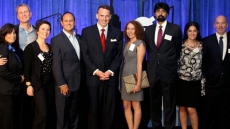VANCOUVER — When it comes to keeping a New Year's resolution, researchers say it's better to ask than tell.
A new study spanning 40 years of research has found that asking questions is a better way to influence behaviour than making statements.
It's called the "question-behaviour effect," a phenomenon in which asking people about performing a behaviour influences whether they do it in the future.
"If you just ask yourself, 'Are you going to exercise next week?' it's going to make your attitudes towards exercising more accessible," said Ioannis Kareklas, an assistant marketing professor at the University of Albany.
"It's going to remind you of all the times you should have exercised and didn't exercise. And, the thinking goes, you're more likely to exercise in the future."
Kareklas was among four researchers from universities across the United States who examined more than 100 studies to provide the first comprehensive look at why the effect occurs. The findings were published this month in the Journal of Consumer Psychology.
The researchers looked at several explanations and found the most evidence to support cognitive dissonance, or the idea that holding two inconsistent thoughts at the same time creates tension and motivates behavioural change.
For example, asking someone "Will you recycle?" will make them think of all the times they failed to recycle as well as the fact that it's good for the environment.

"At the same time, you're holding two inconsistent thoughts — the idea that you haven't recycled in the past, and the idea that you should be recycling, because that's what society expects of you," said Kareklas.
"This literature would suggest the only way to alleviate that tension that's created by cognitive dissonance is to engage in the behaviour in the future."
Kareklas noted it helps to ask a "yes" or "no" question. Studies have shown a stronger effect from a question like "Will you vote in the next election?" as opposed to "What is the likelihood you will vote in the next election?"
The technique has been shown to influence a wide range of behaviours, including cheating less in college and reducing gender stereotypes.
And it doesn't just affect you the next time you're faced with choosing whether to throw out a pop can or lace up your running shoes. The effect has been shown to last more than six months after questioning.
"There are a couple of studies reporting effects up to a year," said Kareklas. "It's a really long-lasting effect with lots of pro-social implications."
He said researchers don't yet know exactly why it's so long-lasting, and that could be one area for future studies to explore.
Kareklas added that the research has wider implications beyond keeping New Year's resolutions. Asking parents "Will you vaccinate your children?" could have positive impacts on public health, even if only a small percentage were swayed.
"If you get an additional 10 per cent of people to be vaccinated, through such a simple effect ... that could be a really a game-changing technique in the long-term for society."






